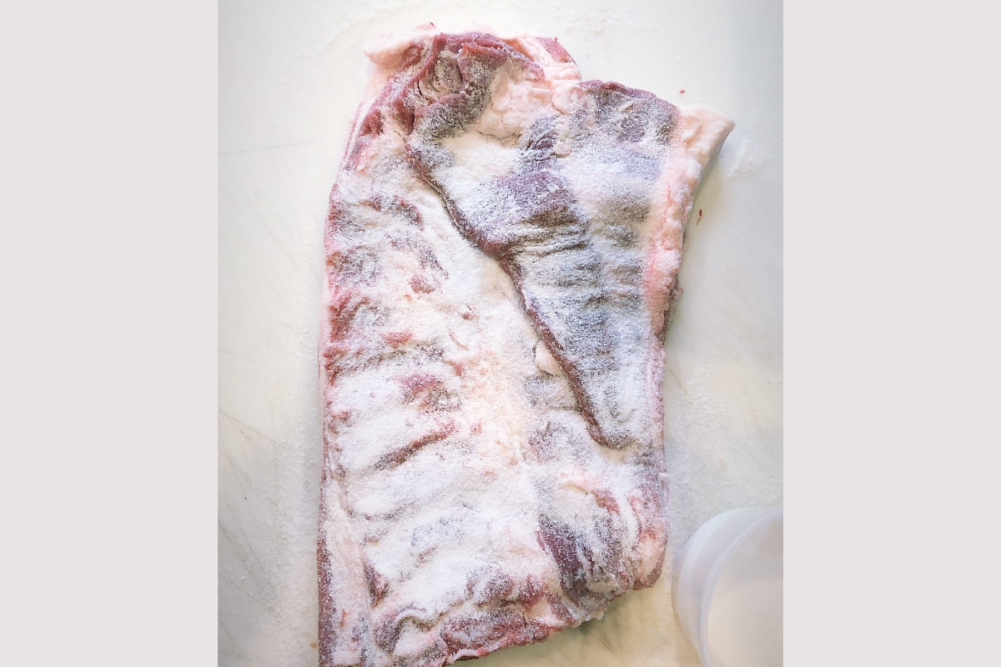A business model that includes a butcher shop, retail store and a restaurant that is able to process bacon in-house to be sold at its store and feature it on its restaurant menu is a strategy made in hog heaven. For the past 2 ½ years, that is what Steven Cabalar and his wife Lianne, owners and operators of Cabalar Meat Co., have been doing. The company is located in the heart of downtown Lancaster, Pa., in southeastern Pennsylvania.
And what makes the bacon from Cabalar Meat Co. even more special is that it comes from hogs that are raised right in the area.
“We want to use bellies for our bacon from animals right here, not shipped in from all over the country, or even outside of the US,” he said.
Cabalar has a smoker on the premises that he uses to create all of his own bacon.
“The whole idea is to be as local as possible, to make use of virtually everything from this region,” he explained.
Cabalar’s whole animal butcher shop occupies 1,900 square feet in part of what had been many years ago a candy factory.
The pigs Cabalar uses to make his bacon come from area farms, where they are raised in both pasture and woodland settings.
“Raising pigs in the woods has become more of trend, especially when you’re acquiring the animals from the region, which is very important to us,” Cabalar said.
He added that he wants his pigs to be fed soy-free, non-GMO grains, and when it is available, seasonal produce.
Making his bacon supports several family farms in the area. And all his smoked meats, including his bacon, are made in-house. The farms where he sources the pigs and bellies for his bacon include the Livengood Family Farm, Country Meadows Farms, Mirror Image Farms and Myer Springdell Farm, all located in Lancaster County.
He works with Tyler Neff, who with his wife Joella, manage Mirror Image Farms. The hogs there are pastured and are moved from paddock to paddock. The pigs raised and used for Cabalar’s bacon are “heritage breeds,” including Tamworths, and Idaho Pastured Pigs. Both breeds are crossed with Berkshire. Heritage breeds refer to “old” genetics, when they are compared to the newer hog breeds developed for conventional hog operations. So, heritage hogs tend to have fatter and more superior flavor and are thought to be more healthy in their outdoor environment. The pigs are excellent foragers, and in pasture they feed on a 25% grass-based diet. The pigs are slaughtered at nearby Smucker’s Meats in Lancaster County, then are processed at Cabalar’s.
“We remove the bellies from the pigs, and they are cured with salt and sugar, which can last seven to 10 days,” Cabalar said. “I go ahead and do the smoking, that’s to 150˚ F, and that is a crisp, hot smoke.”
The destination of Calabar’s bacon, since he serves three meals a day in his restaurant, is traditional breakfast meals like bacon and eggs. But also, his bacon is very popular in toppings for hamburgers and other meat entrees. Because of the coronavirus pandemic, his restaurant business is limited to carry out at this point. But that has not hurt the demand for his bacon.
“So, for example, here’s how our bacon is used to make bacon burgers,” Cabalar said. “In addition to the bacon and the burger, we make a garlic mayonnaise, usually a sharp cheese for a bacon burger with cheese, then we add caramelized onions. It’s kind of like a ‘bacon jam’ if you think about it.”
Other bacon items on the menu include bacon fat and bread crumbs in a pulled pork mac (mac and cheese), a barbecue bacon sandwich, which includes sweet onion, jam, smoked bacon, aioli (mayonnaise and a lot of garlic) and Cooper sharp cheese; and a Monte Cristo, which includes candied bacon, maple cinnamon butter, smoked ham, over easy eggs and Cooper sharp cheese.
“We try to do everything we can in-house, as much as possible, with the bacon, including selling bacon, and using it in the restaurant. That is the idea behind what we are trying to do here,” he said.



